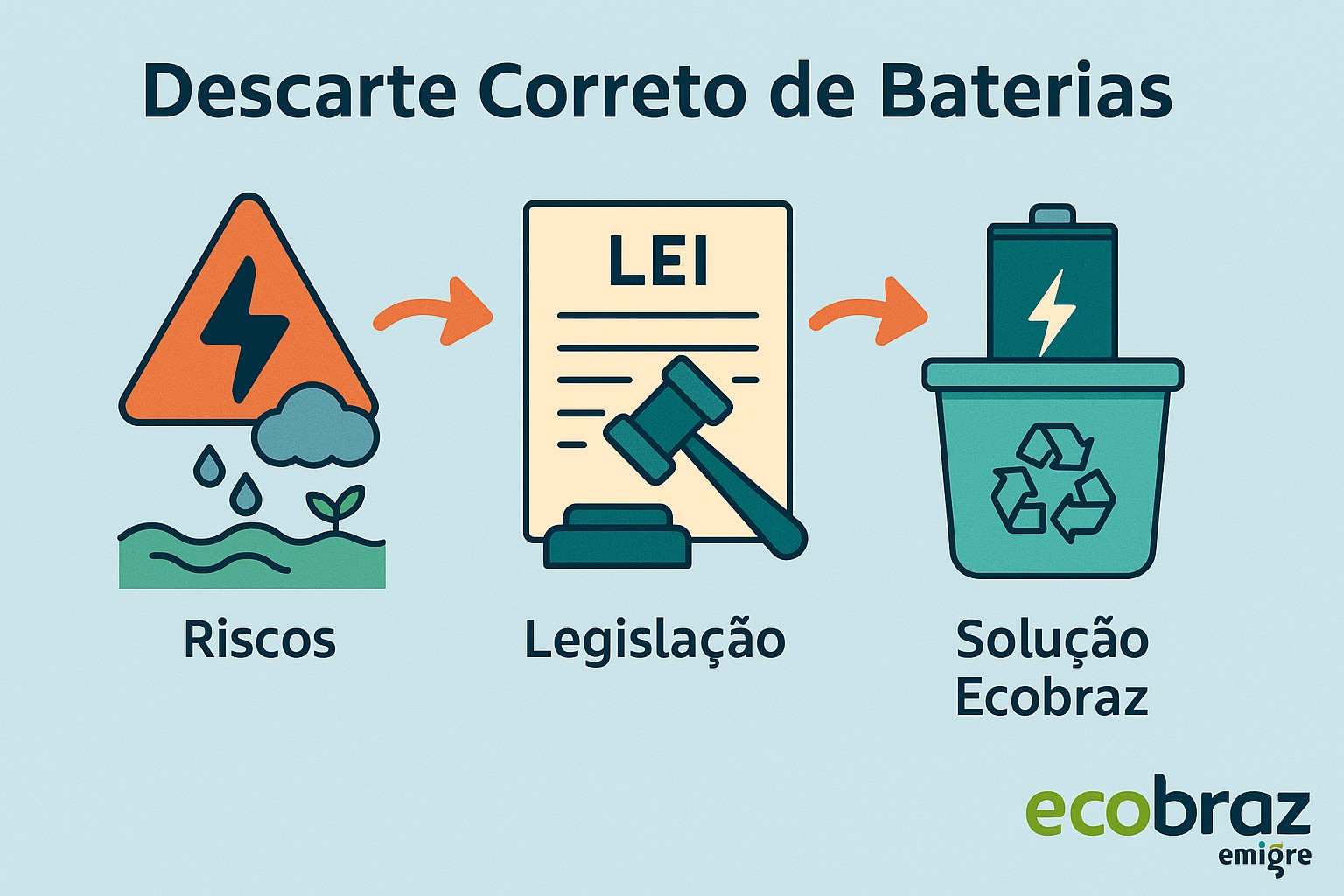Publication date: 2025-10-27
Proper battery disposal: legislation, environmental risks, and corporate solutions
Description: Battery disposal is one of the biggest environmental challenges of our time. With high concentrations of heavy metals and toxic components, improper handling can severely contaminate soil and water. This guide presents current legislation, key risks, and the solutions offered by the Ecobraz Emigre NGO, a global leader in electronic waste recycling.
Why does battery disposal require special attention?
Batteries, found in mobile phones, laptops, electric vehicles, and industrial equipment, contain metals such as lead, cadmium, mercury, nickel, and lithium. When improperly discarded, these substances can leak, contaminating soil, rivers, and even groundwater reserves.
Studies by the International Energy Agency (IEA) show that demand for lithium-ion batteries is expected to grow sevenfold by 2030, driven by the electric vehicle and mobile device markets. This scenario reinforces the urgent need for robust collection and recycling systems.
Brazilian legislation on battery disposal
In Brazil, CONAMA Resolution No. 401/2008 sets limits for heavy metals in batteries and obliges manufacturers and importers to ensure proper collection and environmentally appropriate disposal. The regulation establishes shared responsibility among manufacturers, importers, distributors, and retailers.
The National Solid Waste Policy (Law No. 12.305/2010) further reinforces corporate obligations to implement reverse logistics systems. Non-compliance may result in fines, civil liability, and even criminal charges.
Main risks of improper disposal
- Soil and water contamination: heavy metals infiltrate quickly into ecosystems;
- Public health risks: exposure to lead and mercury can cause neurological and kidney diseases;
- Fires and explosions: lithium-ion batteries discarded improperly can catch fire or explode;
- Environmental liabilities: companies failing to comply may face lawsuits and multimillion-dollar fines.
Practical solutions with the Ecobraz Emigre NGO
The Ecobraz Emigre NGO provides safe and fully documented solutions for companies needing to dispose of batteries in compliance with the law:
- Large-scale collection: services tailored for industries, multinationals, and large retailers;
- Proper storage: certified facilities to prevent leaks and explosion risks;
- Specialized processing: dismantling, neutralization, and recycling of components;
- Complete documentation: issuance of manifests, technical reports, and ESG statements;
- B2B focus: customized solutions according to each partner’s scale and needs.
Positive impacts of proper disposal
Beyond reducing environmental and legal risks, proper battery disposal generates strategic advantages for companies:
- Corporate reputation: strengthens sustainable branding with clients and investors;
- Regulatory efficiency: prevents fines and lawsuits;
- Circular economy: recovery of valuable metals such as cobalt and nickel;
- ESG alignment: direct contribution to sustainability and governance reports.
Official references
This guide is based on reliable and official sources:
- IBAMA – Brazilian Institute of Environment
- Brazilian Ministry of the Environment
- CONAMA – National Environmental Council
- IEA – International Energy Agency
Conclusion
Battery disposal is a strategic issue that goes beyond legislation. It represents an opportunity for companies to align with sustainability best practices and ESG goals. The Ecobraz Emigre NGO is a global leader in this process, ensuring safety, compliance, and complete documentation for corporate partners.
Call to action
Ensure your company’s compliance with environmental law. Contact the Ecobraz Emigre NGO today and implement a safe battery disposal system.
📞 +55 11 4329-2001
✉️ contato@ecobraz.org.br
🌐 www.ecobraz.org


Deixe um comentário
O seu endereço de e-mail não será publicado. Campos obrigatórios são marcados com *